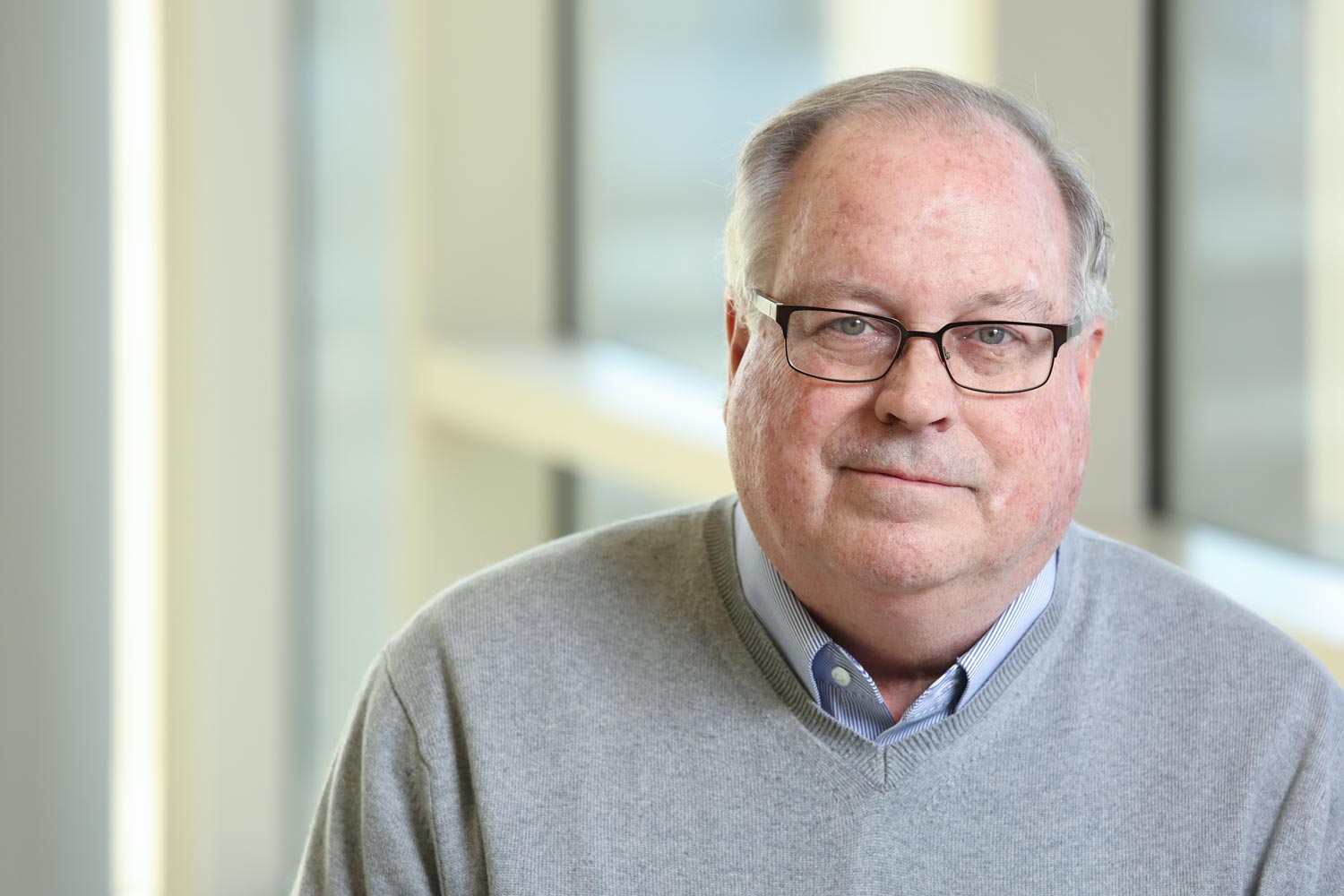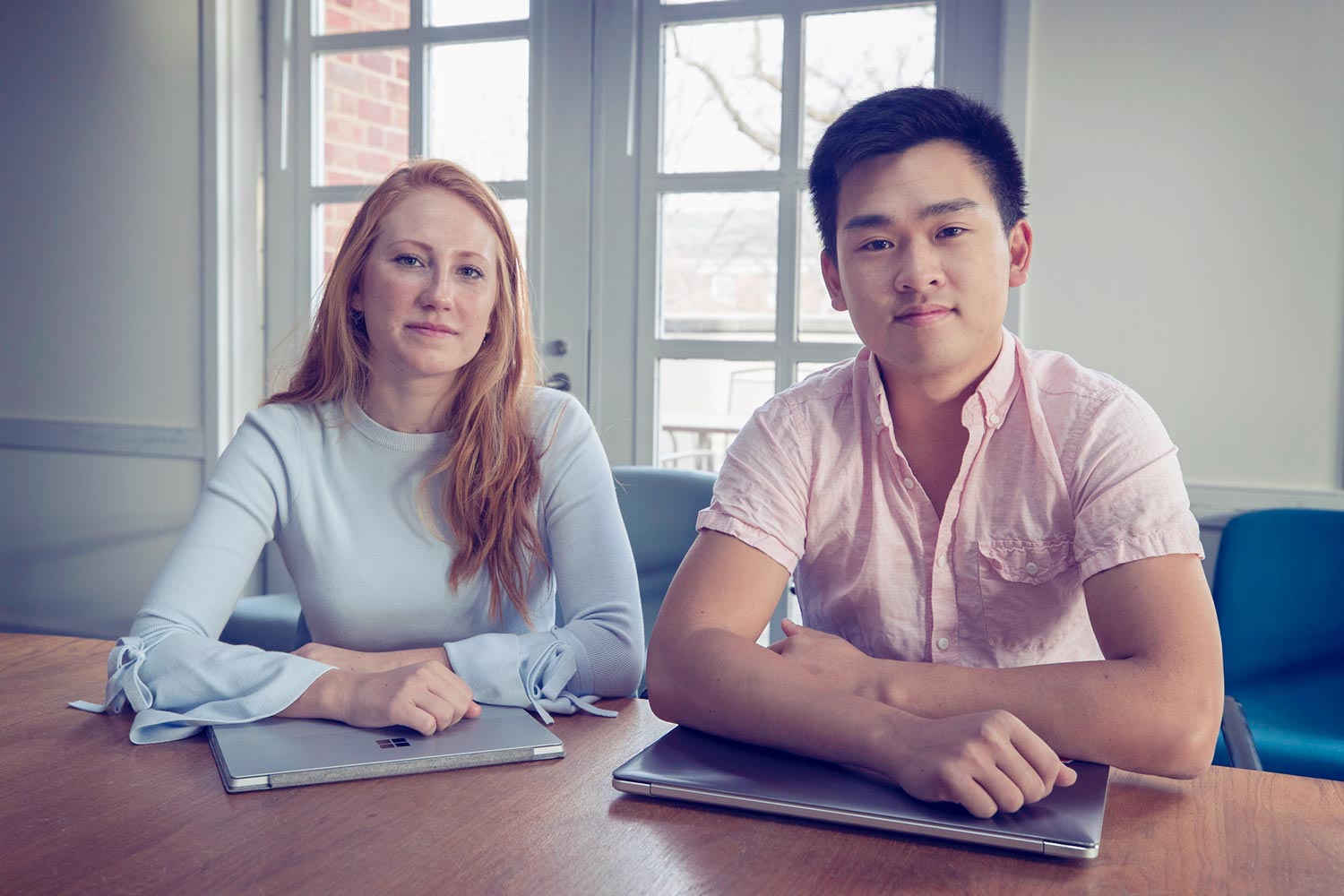For chemical engineers, roasting a turkey is a lesson in heat transfer. The larger the bird, the longer it takes to transfer enough heat into the bird to cook it.
And then there’s the question of stuffing.
Members of the University of Virginia’s chapter of the American Institute of Chemical Engineers demonstrate this every year with a Thanksgiving potluck supper, where the third- and fourth-year classes compete to see whose heat transfer lesson tastes better.
“One year, some of the students got a frozen bird the day before the dinner,” said Michael L. King, a professor of practice in the Department of Chemical Engineering and chapter adviser. “They didn’t realize they had to thaw it. One of the students stayed up all night soaking the bird in warm water trying to thaw it. They ended up cutting it in halves and cooking them flat in the pan.”

Chapter adviser Michael L. King is a professor of practice in the Department of Chemical Engineering. (Photo by Tom Cogill)
This year the turkey prepared by third-year chemical engineering students Melissa Molestina of Bristow and Brooke Noeska of Stafford was declared the winner, beating out a bird prepared by fourth-year student Derek Wu, who is also president of the chapter.
“Even Derek admitted theirs was moister,” King laughed.
The UVA chapter also provides career opportunities, mentoring, faculty and alumni interaction and camaraderie. It is so good at this, the institute has named it an outstanding national student chapter in nine of the past 10 years.
“The American Institute of Chemical Engineers is among the older engineering societies,” King said. “To consistently be in the top 10 percent indicates an exceptional level of leadership, professionalism and participation. About 85 percent of the chemical engineering majors are members of the chapter.”
In being judged a top chapter, Wu said the group is examined on how many members it has, what percentage of the majors in the field they represent, how engaged the students are with the faculty and the amount of support the chapter has.
The chapter, one of 175 in the U.S., has 120 members, about 40 from each of the second-, third- and fourth-year classes. It is a conduit for the chemical engineering majors to interact with their counterparts in the professional world.
“I’ve gone on plant tours that weren’t available to the public,” said Ben Motter, a third-year student from Williamsburg, who said the chapter helped him socially as well as with this major.
“This group brings together people who wouldn’t normally be friends just from going to class together,” he said. “But all of this has pushed me beyond what I thought I was capable of. I have learned that I can do more than I thought, if I work with other people. I used to just tackle things myself, but now I am learning that many minds can work together.”
Noah Rushin of Ashburn, a second-year representative in the chapter, said the society’s chapter “brings us all together. It’s a good way to get to know other chemical engineering students, especially the upperclassmen.”
Wu said the chapter provides peer mentors to help the younger students with their school work and improving their personal communications skills.
Liliana Bettolo of Oakton, director of the chapter’s Alumni and Corporate Relations Committee, engineered a networking night in September with representatives from 15 companies, including Exxon-Mobil, Merck and Eli Lilly, for students to talk about jobs and careers.
“The chapter offers a lot of opportunities like the networking night,” said Andrew Ferguson, a fourth-year student from Newport News. “They do a great job of communicating opportunities.”
Ferguson said he chose chemical engineering because he is good at chemistry and math. “And I’m a big fan of puzzle solving,” he said. “In chemical engineering, you are given the information to solve the puzzle. But it is not like a Sudoku or a crossword where there is one right answer. It’s based on assumptions and possibilities. It’s solution-focused thinking.”
Through the chapter, students network with chemical engineering alumni.
“It’s an opportunity for us to learn what they are working on and learn how to better improve ourselves and prepare for seeking a job,” Wu said. “With the alumni, we have connections that can get our feet in the door. They are a wealth of information for us.”
Bettolo’s Alumni and Corporate Relations Committee also arranges contacts with industry.
“Our committee arranges plant tours so ChemEs can meet people,” Bettolo said. “We arrange for professional development workshops, so students can work on their personal brands.”
“Students get their first jobs through events like the networking night,” Wu said. “Students want resources. They feel comfortable coming to us and that allows us to serve the students better.”
Wu said chemical engineering is such a rigorous and stressful major that one of the chapter’s primary functions is to promote community through events such as the Thanksgiving potluck dinner.
“We also have mental health dialogues with the faculty, asking for advice on time management,” Wu said. “And we have a mentor program where we pair up third- and fourth-year students with second-years, to help them with course work and class choice. It helps strengthen bonds among the students.”
Wu and Bettolo agreed the third year is the hardest, and mentors and friends help the students through it.
The chapter is also successful because of the continuity of its leadership. When Wu was a second-year student, his mentor was Alex Yang, then the chapter’s president. Wu volunteered to be the second-year representative on the executive council.
“Being on the executive council made me realize how important the chapter was as a link between the faculty and the students,” Wu said.
Bettolo accepted her leadership role because she developed expertise in searching out internships, expertise she used to organize the fall network night.
“ChemEs are so busy they have no time to fit this in,” she said. “I wanted to show them the resources I had found, and how to use the school and alumni networks.”

Wu, from Fort Myers, Florida, is interested in working in biopharmaceuticals. He came to UVA because he was impressed with the strong sense of community and scholastic development.
“I knew I wanted to be an engineer and chemical engineering seemed to be one of the most flexible,” he said. “There are wide applications for it and I have seen people getting jobs in computer science and consulting, gas, oil and energy, and plastics.”
Bettolo is the first college student in her family, inspired by her grandfather, a textile engineer in Italy who made machines that weave lace patterns and silk. While she had a romantic image of engineering, her mother urged her to select a field in which she could find employment.
Wu and Bettolo said they have benefited from being chapter officers.
“I have gained a sense of tenacity and resilience,” Wu said. “A lot of my duties are rigorous and time-sensitive. I have learned to shoulder responsibility on top of academic work. In this job, a lot of people look up to you. I need to keep chugging along and balance things.”
Being an officer has tempered Bettolo, who has always had a love of big ideas, she said. “I want to be a game-changer in this world,” she said. “I came into this position with big ideas and I learned how to follow through and make them a reality.”
Media Contact
Article Information
December 4, 2017
/content/chemical-engineering-camaraderie-bonding-over-tasty-heat-transference

